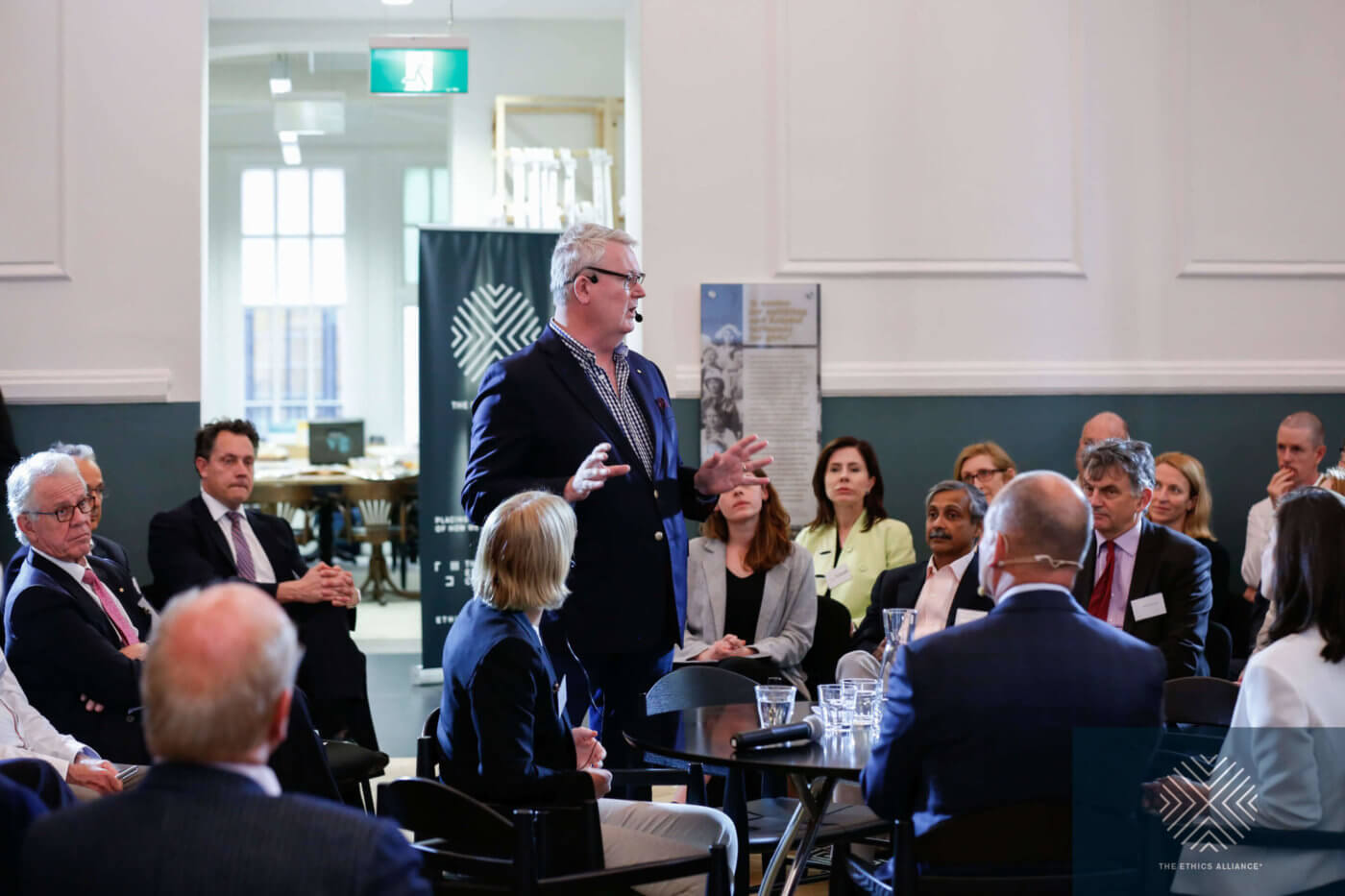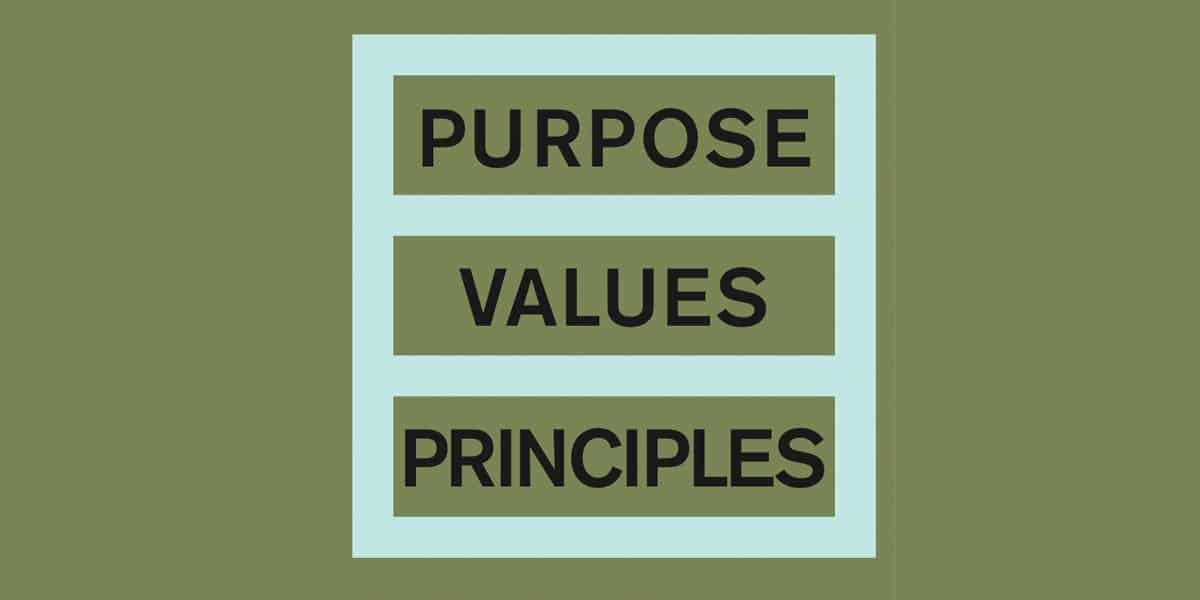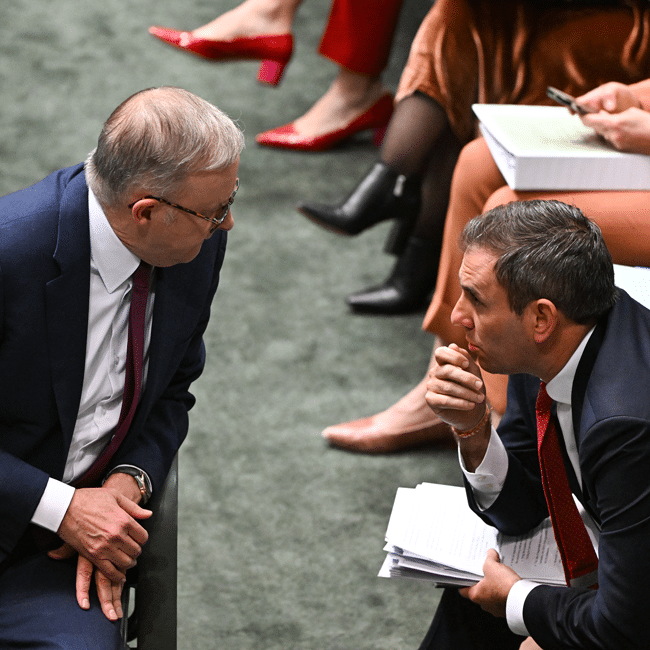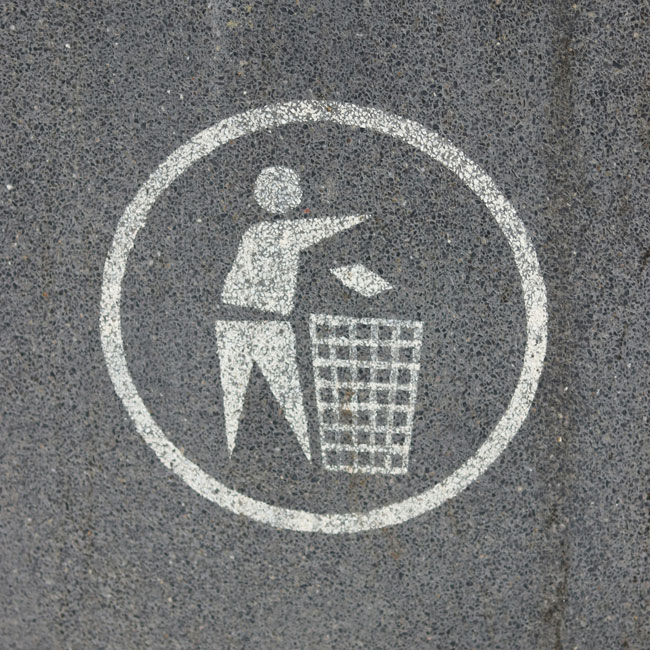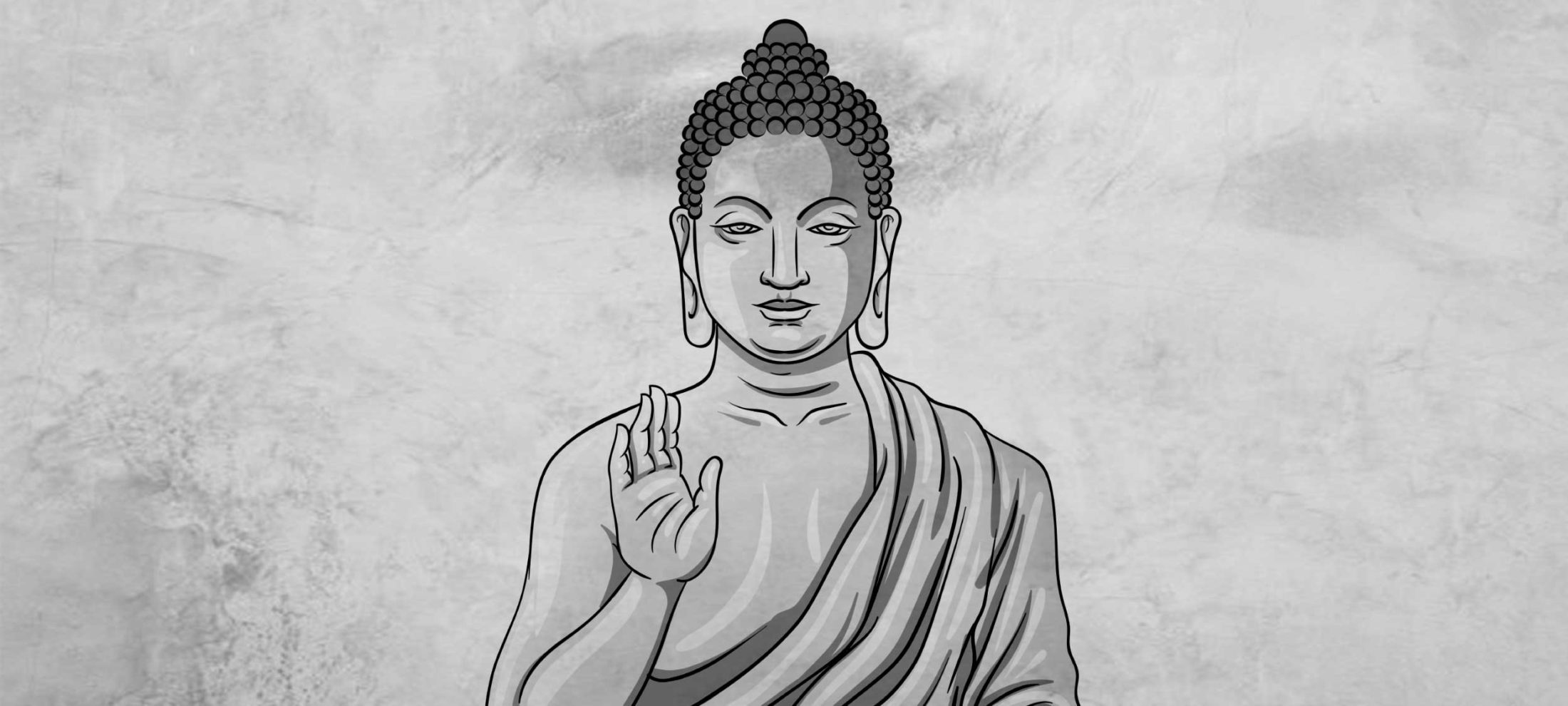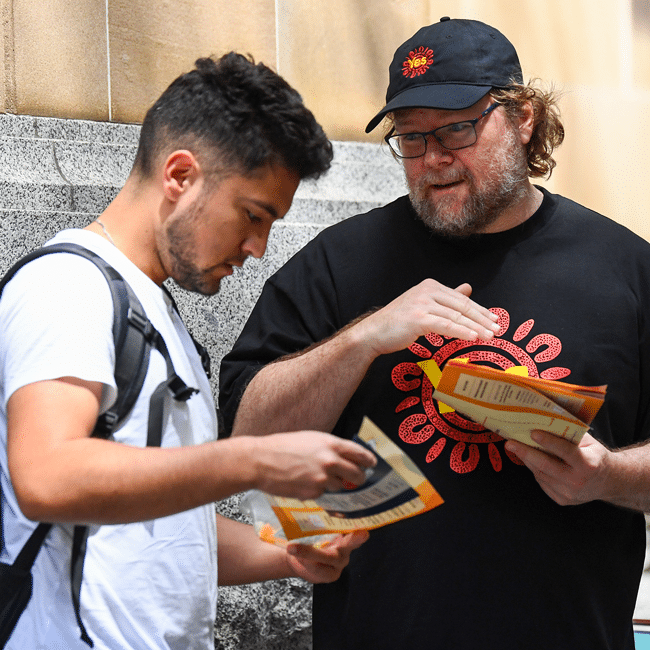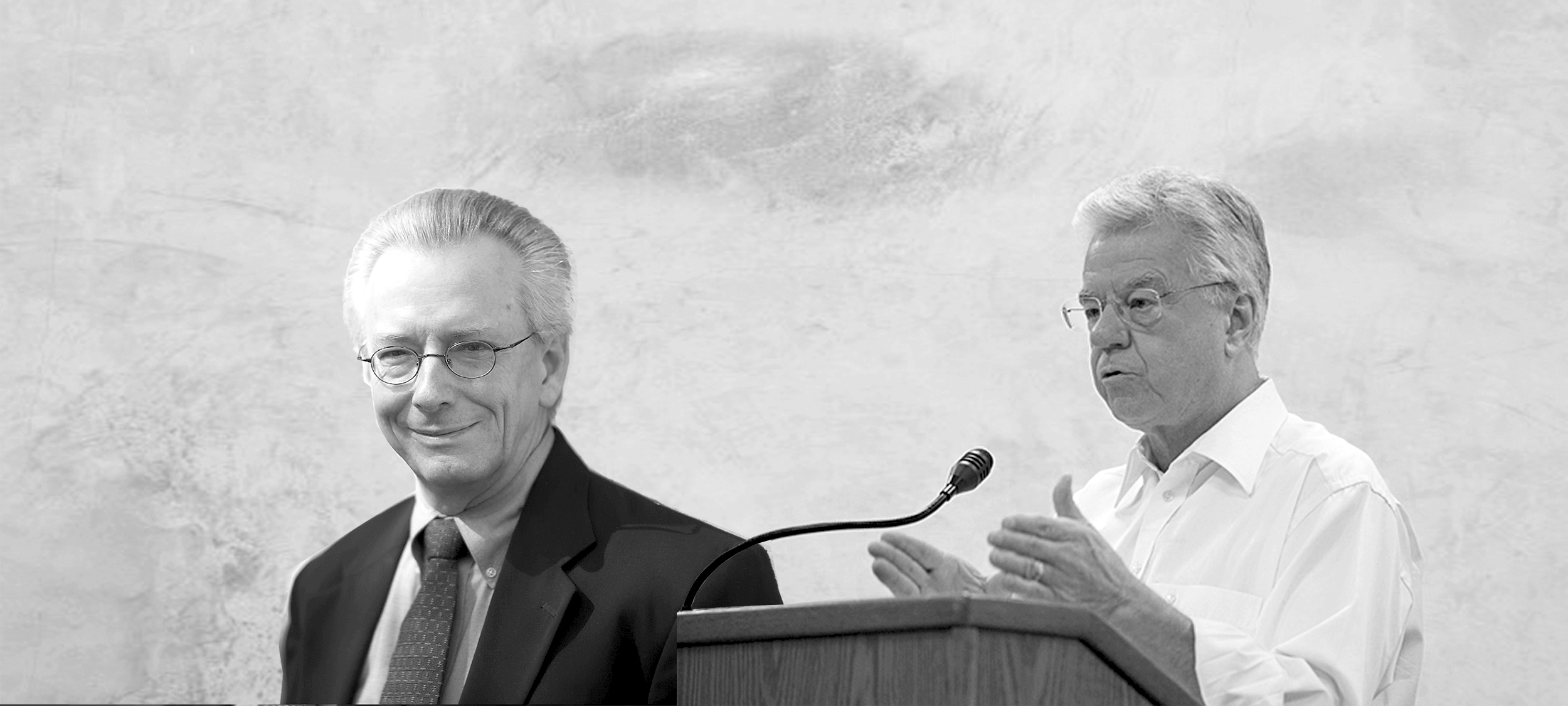Do Australian corporations have the courage to rebuild public trust?

Do Australian corporations have the courage to rebuild public trust?
Opinion + AnalysisBusiness + Leadership
BY Carl Rhodes 27 SEP 2023
Corporate Australia is having a rough time in 2023.
PwC made headlines for selling out Australian citizens by flogging details of the government’s tax avoidance schemes to potential corporate tax avoiders. Qantas has been raked over the coals for, amongst other things, lying to customers and illegally sacking workers. Elsewhere corporations are pilloried for scandalously excessive executive pay, Dickensian industrial relations standards, wilfully aggressive tax avoidance, and heartless profiteering.
Research by the market researchers at Roy Morgan recently revealed that the level of trust Australians have in corporations is at the lowest it has ever been since they started measuring it. The downward trend started with COVID but has been in free fall since the middle of 2022. Roy Morgan CEO Michelle Levine describes what is going on as the result of ‘moral blindness’ of corporations.
There is an apparent irony in play. Today’s corporations are accused of this moral blindness, while many publicly embrace ethics by taking increasingly active roles in important matters of public purpose and social impact. Corporations are weighing in on a variety of crucial political issues, such as the Indigenous Voice to Parliament, LGBTQIA+ rights, and the climate crisis.
Business as a force for good?
In the era of ‘woke capitalism’ the business world seems to feel little cognitive dissonance, let alone hypocrisy, about parading their ethical credentials in public while acting like ruthless and exploitative profiteers in the market. Being economically exploitative and socially progressive is the name of the game for many corporations.
The socially progressive position regards businesses as having the potential to be a ‘force for good’, especially by adopting progressive positions on social and environmental causes. Think of Qantas’ ‘pride flights’, PwC’s commitment to social impact, or the broad adoption of diversity and climate change initiatives by businesses of all kinds.
Many regard corporate engagement with political causes as being genuinely motivated by ethical care for their ‘stakeholders’. This view is not universal. Others see corporate activism as comprising of shallow, inauthentic and self-interested grandstanding. Between green-washing, woke-washing and virtue-signalling, corporations have been accused of using ethics to feather their own nests.
Yet others see corporate social and environmental engagement as incontrovertible evidence that CEOs have been held captive by radical left-wing activists. By this account weak-willed executives are being exploited by nefarious militants trying to use corporations as a Trojan Horse to infiltrate mainstream society.
The ‘vile maxim’ of corporate selfishness
Whichever position you might be aligned with, so-called ‘woke’ practices are in apparent contrast to the exploitative and ruthless competitive behaviours of companies like Qantas and PwC that have contributed to the demise of trust in corporations. When it comes to business, the ethical principle at play is akin to what, many years ago, economist Adam Smith condemned as the ‘vile maxim’. As he wrote in The Wealth of Nations back in 1776:
“All for ourselves and nothing for other people, seems, in every age of the world, to have been the vile maxim of the masters of mankind. As soon, therefore, as they could find a method of consuming the whole value of their rents themselves, they had no disposition to share them with any other persons.”
It is clear that many people running businesses today are enthusiastic followers of this vile maxim. To suggest this is ‘moral blindness’ can be misleading because (no matter how vile) there is an ethics at play here, and one that is widely accepted. Ayn Rand notoriously championed such an ethics as being beholden to ‘the virtue of selfishness’. By Rand’s account, pursuing self-interest is a valid, if not desirable, moral position. She stood against sacrifice as being a moral principle, instead seeing merit in “concern with one’s own interests”.
Free market capitalism was, for Rand, an ideal manifestation of her ethics. This all suggests that selfishness is not moral blindness, it is part of an ethical system that drives much business behaviour. It is also the ethics that is at the heart of Australia’s lack of confidence in the corporate world.
How to build trust
Between the twin poles of ‘woke capitalism’ and the ‘vile maxim’ we have something of a corporate identity crisis. Increasingly selfish profit-seeking in the economic sphere is matched with attestations to the pursuit of public good in the social sphere. That is not to say that all companies are vile or woke, clearly many are not. It is a fair call that enough of them are that it has led to a breakdown of public confidence in corporate Australia.
What does this all mean for how Australian corporations can build public trust? One answer is resolving their identity crisis by truly embracing and communicating the role of business in a liberal-democratic society. While businesses are responsible for returns on capital investment, that is neither their sole nor primary purpose. Neither is supporting progressive social positions without concern for the economy.
In its present condition Australian corporate capitalism is characterised by skyrocketing economic inequality, excessive executive pay, inflation fuelled by profiteering, and increasingly precarious employment. That Australian citizens do not trust corporations is an entirely rational assessment.
Corporate Australia’s challenge is to actively recognise and pursue its real social purpose. This purpose is about driving innovation and economic growth for shared prosperity, providing meaningful and secure jobs with decent pay, paying taxes that fund public services, as well as ensuring investors get a reasonable return.
Rebuilding trust is simple. What remains to be seen is which of Australia’s fallen corporations will have the courage to abandon their attachment to the vile maxim.
Ethics in your inbox.
Get the latest inspiration, intelligence, events & more.
By signing up you agree to our privacy policy
You might be interested in…
Opinion + Analysis
Business + Leadership, Politics + Human Rights, Relationships
It’s time to increase racial literacy within our organisations
Opinion + Analysis
Business + Leadership
Why the future is workless
Opinion + Analysis
Business + Leadership
The Ethics Alliance: Why now?
Opinion + Analysis
Business + Leadership, Society + Culture
A win for The Ethics Centre
BY Carl Rhodes
Carl Rhodes is Dean and Professor of Organization Studies at the University of Technology Sydney Business School. Carl writes about the ethical and democratic dimensions of business and work. Carl’s most recent books are Woke Capitalism: How Corporate Morality is Sabotaging Democracy (Bristol University Press, 2022), Organizing Corporeal Ethics (Routledge, 2022, with Alison Pullen) and Disturbing Business Ethics (Routledge, 2020).
People first: How to make our digital services work for us rather than against us

People first: How to make our digital services work for us rather than against us
Opinion + AnalysisBusiness + LeadershipScience + Technology
BY Cris Parker 5 SEP 2023
Advancements in technology have shown greater efficiency and benefits for many. But if we don’t invest in human-centric thinking, we risk leaving our most vulnerable behind.
As businesses from the private and public sector continue to invest in improved digital processes, tools and services, we are seeing users empowered with greater information, accessibility and connectivity.
However as critical services for healthcare, lifestyle and support systems have become increasingly digitised, the barriers for vulnerable, remote or digitally excluded individuals must also be considered against these benefits.
It’s no wonder the much-maligned MyGov app underwent an audit review earlier this year, resulting in a major overhaul of the service. Reading through their chat rooms and forums where customers can express their experiences, comments like these fill the pages:
“…If you’re trying to do something online, even if you’ve got a super reliable connection, you can spend hours wandering around in a fog because there’s no transparency about – they’re not trying to make it easy for people.”
“You need to have acquired the technology to do it, but you get on their websites, and I don’t know who designs their systems. But you’ve got to be psychic to be able to follow what they want. In order to get what you need, you’ve got to run through this maze, it’s complete bullshit.”
“And you’re already putting elderly people and keeping them in a home, it all goes online and digital, they stop having that outside interaction. It’s another chip away of community. That’s where the isolation comes in.”
Reading these statements, you get a sense of the frustration and confusion felt, not just due to time wasted but also the loss of a personal connection and agency. These experiences can lead users to doubt the reliability of business’ processes and chip away at the trust in their systems.
The Australian Digital Inclusion Index cites digital inclusion as “one of the most important challenges facing Australia.” Their 2023 key findings presented that digital inclusion remains closely linked to age and increases with education, employment and income.
So, as technology becomes more ubiquitous in our lives, how do we maintain human centric thinking? How do we avoid exacerbating existing inequalities while maintaining respect, autonomy and dignity for all?
Looking for some answers, I spoke to Jordan Hatch, a First Assistant Secretary at the Australian Government and someone who is passionate about designing for user needs. Hatch is currently working with the care and support economy task force in the Department of Prime Minister and Cabinet, exploring some of the challenges and opportunities across the care sector.
Hatch is acutely aware that amidst this digital transformation, the welfare of vulnerable individuals remains a priority. He explains human-centered design principles must play a crucial role in shaping digital solutions. Importantly, understanding the user base, including different cohorts and their specific needs, is foundational to designing inclusive services. Extensive research and involvement of First Nations communities, individuals with low digital literacy, or limited internet access are also essential to developing solutions that address their unique challenges.
Hatch explains how technology is transforming the face-to-face experience. He says the digitisation of services has prompted a re-evaluation of the role of physical service centres. The integration of digital and in-person channels is allowing for streamlined processes and improved customer experiences.
A great example is Service NSW, which has become a centralised hub offering access to several support services. The availability of digital options has not led to the exclusion of those who prefer face-to-face interactions. On the contrary, it has allowed for a more comprehensive and improved service for individuals seeking in-person assistance. The digital transformation has become a means to augment the service experience, rather than replacing it. When visiting a Service NSW centre, you are met by a representative who directs you to a computer and, if required, walks you through the online process, offering personalised support. This evolution caters to diverse needs, ensuring that the face-to-face experience remains valuable while offering alternative modes of engagement.
Of course, increasing the capability and use of technology has its downside. Digital interactions have become a societal norm and an opportunity for scams. This has led to a number of digital hoops users are obliged to make in an attempt to protect their data and privacy. This process can impact the users’ wellbeing as passwords are lost or forgotten and the digital path is often confusing.
Hatch explains in this learning journey, how a shift in his perception occurred regarding the relationship between security and usability. Previously, it was believed that security and usability were at opposite ends of the spectrum—either systems were easy to use but lacked security, or they were secure but difficult to navigate. However, recent technological advancements have challenged this notion. Innovations emerged, offering enhanced security measures that were user-friendly. For example, modern password theories promoted the use of longer passphrases consisting of simple words, resulting in both stronger security and increased user-friendliness.
Technological transformation is a process and technology is not a panacea – it is a steppingstone and an opportunity for simplification and identifying unique solutions. What we can’t do is allow technology to overshadow the need to address regulation and the complexity it can create.
Hatch shares an insight from Edward Santos, the former Human Rights Commissioner to Australia: the prevalent mindset of the technology world being, “move fast and break things”. This is often seen as innovation, and an opportunity to learn from failure and adapt. However, in the realm of public service, where real people’s lives are at stake, the stakes are higher. The margin for error in this context can have tangible consequences for vulnerable individuals.
Slowing down is not necessarily the solution, particularly when you see or experience the harm caused by a misalignment between requirements and the capacity to meet them. It is the work Jordan Hatch describes where the issue is not when, but how services are designed and delivered that will make the difference.
The intersection between technology and policy creates an opportunity for regulators and digital experts to come together. Rather than digitise what exists, they can identify the unnecessary complexities and streamline the rules. This then creates a win-win situation – through the lens of human-centred design, it facilitates the digitisation process and creates a simpler regulatory framework for those who choose not to use a digital process.
With this approach we can design technology to work for us rather than against us.
Ethics in your inbox.
Get the latest inspiration, intelligence, events & more.
By signing up you agree to our privacy policy
You might be interested in…
Opinion + Analysis
Business + Leadership, Health + Wellbeing
The super loophole being exploited by the gig economy
Reports
Business + Leadership
A Guide to Purpose, Values, Principles
Opinion + Analysis
Politics + Human Rights, Business + Leadership
Political promises and the problem of ‘dirty hands’
Opinion + Analysis
Business + Leadership
Hindsight: James Hardie, 20 years on
BY Cris Parker
Cris Parker is the former Head of The Ethics Alliance and a Director of the Banking and Finance Oath at The Ethics Centre.
Self-interest versus public good: The untold damage the PwC scandal has done to the professions

Self-interest versus public good: The untold damage the PwC scandal has done to the professions
Opinion + AnalysisBusiness + Leadership
BY Simon Longstaff 7 JUN 2023
The unfolding PwC scandal could be considered nothing more than an especially egregious example of ethical failure with dire consequences.
However, there are deeper issues to be examined. The most obvious concerns the proper role of the Australian Public Service, and whether or not efforts by successive governments to hollow it out have caused damage that will take a generation to repair. Less obvious is the damage done to an essential component of Australia’s ethical infrastructure: the professions.
Australian governments have long been captivated by physical and technical infrastructure. Few politicians can resist the opportunity to don a hard hat and hi-vis vest when announcing new investment in road, rail, bridge and dam projects. There is equal pride in initiatives including the National Broadband Network, quantum computing and improved cybersecurity.
Unfortunately, there is little interest in the ethical “infrastructure” that determines the extent of public trust in major public- and private-sector institutions. Without that trust, reform becomes almost impossible – or only after untimely delays and great cost.
As with physical and technical infrastructure, the quality of a nation’s ethical infrastructure has tangible effects on a nation’s economy. For example, Deloitte Access Economics has estimated that just a 10% improvement in ethics, across Australia, would generate an extra A$45 billion in GDP each year.
What is ethical infrastructure?
There are many components to this ethical infrastructure. However, one of the most important is the professions – whose members influence nearly every aspect of our lives. To understand their distinctive role, one needs to recognise the difference between two “worlds”: those of the market on one hand, and the professions on the other.
The essential character of the market was defined by Scottish economist and philosopher Adam Smith. It is a place where self-interested actors satisfy the wants of others. Smith prohibits lying, cheating or the oppressive use of power – as all harm the free market. Self-interested conduct is mediated by the so-called invisible hand, which Smith argues leads to an increase in the stock of common good. Indeed, that is the test any market must pass: does it, in practice, make us all better off?
The second world – the professions – is, in two respects, the opposite of the market. First, members of the professions do not satisfy the wants of others; they are obliged to serve the interests of others. For example, a diabetic might want to consume a large block of chocolate. The market will happily satisfy this want as long as the customer can pay the tariff. However, a doctor will refuse to provide the chocolate because it is not in the interests of their patient to do so.
Second, professionals are obliged to put aside self-interest in favour of the public good. For example, as officers of the court, lawyers are obliged to help in the administration of justice. This takes precedence over duties to the client and to the profession. Only after all other interests have been served may a lawyer look to their self-interest. The same holds for the members of every true profession.
In recognition of this practice, society enters into a social compact with the professions. It accords status, and gives them access to certain work that others may not do. It establishes privileges (such as the shield laws that protect journalists’ sources). The quality of the social compact waxes and wanes over time – but can exist only for as long as the professions honour their commitment to reject the logic of the market.
The importance of independence
It is the ethical foundations of the professions – in particular the putting aside of self-interest – that makes it possible for Australian governments to outsource public-sector functions to large, professional consulting firms such as PwC. After all, governments have an inalienable duty to act solely in the public interest. It is inconceivable they would turn over any of their functions to a self-interested entity. That would be to invite the fox into the hen house.
Central to each of the “Big Four” consulting firms is their auditing practice. Compared with consulting, auditing is a minnow in terms of revenue and influence. However, there lies the core of accounting’s professional ethos with its commitment to what is true and fair.
Auditors should be the quintessential professionals – independent and divorced from the ethos of the market. So, when an auditing firm, like PwC, works for government, it is assumed they can be trusted. Until they cannot.
What impact will PwC’s behaviour have on other professions?
We do not know the full extent of what happened at PwC. However, it seems likely that, at some point, some part of the firm abandoned the world of the professions in favour of the market – placing self-interest before all other considerations.
Now we are left to wonder. Was this just a small part of PwC, or has the rot infected larger parts of the company? If the professional ethos of PwC has been corrupted, how is this risk being managed in other, similar organisations?
Most troubling of all, can society still rely on the social compact it has struck with the professions more generally? Or has this once-vital piece of ethical infrastructure fallen into disrepair?
Whether you care about the quality of our society, or the economy, or the possibility of progress, you should care about the quality of our nation’s ethical infrastructure. It’s time to reinforce what remains so it’s not all lost, through neglect, cynicism or indifference, and to our considerable cost.
This article was originally published in The Conversation.
Ethics in your inbox.
Get the latest inspiration, intelligence, events & more.
By signing up you agree to our privacy policy
You might be interested in…
Opinion + Analysis
Politics + Human Rights, Business + Leadership, Society + Culture
Our dollar is our voice: The ethics of boycotting
Opinion + Analysis
Business + Leadership
Susan Lloyd-Hurwitz on diversity and urban sustainability
Opinion + Analysis
Business + Leadership, Relationships, Science + Technology, Society + Culture
Who does work make you? Severance and the etiquette of labour
Opinion + Analysis
Business + Leadership
Explainer: Getting to know Richard Branson’s B Team
BY Simon Longstaff
Simon Longstaff began his working life on Groote Eylandt in the Northern Territory of Australia. He is proud of his kinship ties to the Anindilyakwa people. After a period studying law in Sydney and teaching in Tasmania, he pursued postgraduate studies as a Member of Magdalene College, Cambridge. In 1991, Simon commenced his work as the first Executive Director of The Ethics Centre. In 2013, he was made an officer of the Order of Australia (AO) for “distinguished service to the community through the promotion of ethical standards in governance and business, to improving corporate responsibility, and to philosophy.” Simon is an Adjunct Professor of the Australian Graduate School of Management at UNSW, a Fellow of CPA Australia, the Royal Society of NSW and the Australian Risk Policy Institute.
It’s time to increase racial literacy within our organisations

It’s time to increase racial literacy within our organisations
Opinion + AnalysisBusiness + LeadershipPolitics + Human RightsRelationships
BY The Ethics Alliance 29 MAY 2023
In order establish more culturally diverse and inclusive workplaces, we need to increase our racial literacy.
We only need to look at the pay gap and underrepresentation in leadership to identify systemic racial issues within our organisations. In 2022, the Everyday Respect Report released from EB & Co identified racism as one of the factors impacting psychological safety and workplace culture. While new research from diversity and consultancy firm, MindTribes uncovered a non-Anglo pay gap within Australian organisations.
Workplace norms, systems and biases have sanitised racism to the point where not only it can affect individual’s mental wellbeing, pay and career progression, but also an organisation’s productivity, culture and consumer response. As ethical leaders we have a responsibility to unveil how racial discrimination plays out in our businesses and what strategies we can use to combat them.
An Ethics Exchange gathering in May 2023, welcomed Diversity Council of Australia (DCA) CEO Lisa Annese and Ethics Alliance members as they shared personal experiences and strategies used when developing Diversity and Inclusion (D&I) programs, and how they recognise and tackle racism within their workplaces.
The DCA has evolved over the last 40 years to become a leading entity which promotes and advances more diverse and inclusive workplaces for the benefit of individuals, organisations and the broader community. Annese says to build strategies that tackle racism in our organisations, we need to start with language.
Let’s start with language
It’s important to understand the difference in language when it comes race and culture, particularly within the Australian D&I context. Culture is defined as a combination of characteristics including ethnicity, ancestry, language, and place of origin, whereas race is generally seen as a social construct related to physical characteristics and group identity.
In response to the White Australian policy there was an effort by Gough Whitlam in the late 1960s to remove “race” from common language in order to reduce racism. This shift resulted in a focus on culture over race, and the country adopted terms such as “non-English speaking background”, embracing the concept of multiculturalism. For instance, since the United Nations created their Elimination of Racial Discrimination Day, Australia is the only country globally that doesn’t use the word race. We instead call it Harmony Day with a focus on harmony for the week. That is what is taught in our public schools and celebrated in our workplaces.
Annese suggests this avoidance of the term “race” in favour of “culture” was also an effort to maintain an existing Eurocentric power structure. For example, the term “culturally and linguistically diverse” was introduced, which broadly referred to anyone who couldn’t trace their origins back to Britain – essentially anyone non-Anglo Celtic. This excludes a large group of people with different experiences and perpetuates a sense of “otherness.”
Once we identify the other it can become easy to treat people differently and not afford them the same respect we would expect ourselves.
While understanding people’s culture is useful, it’s crucial to talk about race and to acknowledge the lived experiences of Australians who experience racism.
DCA research suggests that in Australia today, those who experience racism and racial marginalisation are people from non-European backgrounds, and the main cause of racism has less to do with language and culture and focuses more on race – features such as phenotype, visible difference, religious dress, skin tone, and hair texture.
If we want to build more inclusive and diverse businesses, we need to talk about race. And to do so, we must know what it is.
By developing an understanding of how history has sanitised our language and normalised racism in our workplace, we are able to discuss the concept of race in a way that avoids unnecessary distress. It’s important not to make assumptions that the harm felt by malintent, or overt racism is any different from the racism embedded in well-meaning or curious comments about an individual’s appearance or background.
Principles and a framework that emerged from The Ethics Exchange and DCA research to bring racial literacy to the workplace included:
- Build Racial Literacy: Before tackling racism, businesses must first educate their employees about the concept of race. They should understand what race is, how racialisation occurs, and the impact it has on people. This is important because most people have low levels of racial literacy.
- Build Confidence: The second step involves helping employees become confident in their understanding of race and racial issues. This stage ensures employees feel comfortable discussing these topics and are prepared for the next step.
- Talk About Anti-Racism: The final stage is to discuss what it means to be actively anti-racist. It is important that employees understand how they can contribute to an anti-racist environment. This stage of the process can only be effectively implemented once employees have a clear understanding of race and are confident discussing it.
One of the most impactful ways of understanding racism is to hear it from those who have been subject to it, however this carries a huge burden or cultural load. How can their voices be included to develop strategies to combat racism?
- Centre Voices: The experiences and perspectives of those affected by racism must be central to any initiatives addressing it. For instance, if a business is developing a Reconciliation Action Plan (RAP) in Australia, it should involve Indigenous employees in the process.
- Respect Cultural Labour: Organisations should acknowledge the cultural emotional and intellectual labour of employees with different social identities involved in initiatives addressing racism.
- Remunerate Appropriately: If individuals are asked to participate in initiatives to combat racism, particularly if they’re asked to share personal experiences or provide additional insights, they should be appropriately compensated.
- Respect Personal Choice: Not everyone will want to be involved in such initiatives, and that choice should be respected.
- Avoid Overgeneralisation and Presumption: One individual cannot represent an entire group. Avoid making assumptions about an entire race or culture based on the perspectives or experiences of one individual.
- Use Available Resources: In an age where information is readily available, it’s possible to educate oneself about different cultures and races without overly relying on individuals from those backgrounds to teach others.
We’d like to thank Lisa Annese and the Ethics Alliance members who contributed to this important conversation.
Find out more about the DCA’s research here.
Ethics in your inbox.
Get the latest inspiration, intelligence, events & more.
By signing up you agree to our privacy policy
You might be interested in…
Opinion + Analysis
Health + Wellbeing, Relationships
Ethics Explainer: Naturalistic Fallacy
Opinion + Analysis
Health + Wellbeing, Relationships
Ask me tell me: Why women think it’s ok to lie about contraception
Big thinker
Relationships
Big Thinker: Buddha
Opinion + Analysis
Relationships, Politics + Human Rights
How to have a difficult conversation about war
BY The Ethics Alliance
The Ethics Alliance is a community of organisations sharing insights and learning together, to find a better way of doing business. The Alliance is an initiative of The Ethics Centre.
Corporate whistleblowing: Balancing moral courage with moral responsibility

Corporate whistleblowing: Balancing moral courage with moral responsibility
Opinion + AnalysisBusiness + LeadershipRelationships
BY Kristina Novakovic 23 MAY 2023
Calling out corporate wrongdoing requires the moral courage to stand up for what you believe in, but also involves recognising the moral agency of others.
The story of Jeff Morris is both inspiring and daunting; inspiring because he decided to take on one of the largest banks in Australia alone by exposing corrupt practices that placed customers in financial danger, and daunting because of the fate that he suffered as a result.
Commonwealth Bank Australia’s (CBA) financial planners knowingly gave harmful financial advice to elderly and vulnerable customers that led them to severe financial losses and emotional distress. Morris spent five years trying to get the CBA and ASIC to confront the wrongdoing and set it right, attempting to force a Parliamentary Inquiry before he finally decided that the only way to protect customers from these practices was to go to the media with his story in 2013. This led to the firing of rogue CBA financial planners involved in these practices and triggered the landmark financial services royal commission.
Today, Jeff Morris stands as an admirable figure, having been awarded the Order of Australia for blowing the whistle on his employer. However, in the immediate aftermath of blowing the whistle on CBA, Morris was fired from the bank, his family left him due to the financial stress his actions put them under, he was diagnosed with PTSD and suffered constant surveillance and harassment.
The whistleblower’s moral dilemma
Corporate whistleblowers, like Morris, face a moral dilemma of balancing competing responsibilities to the organisation they work for and the responsibility they have to the consumer.
As an employee of the CBA, Morris was presumably hired with the condition that he must keep confidential information about the bank’s internal practices. This is often non-controversial. Corporations have valid reasons for not wanting their internal practices revealed, like wanting to protect their unique products and services from competitor corporations. When signing an employment contract, we often find that we’re being asked to sign a confidentiality agreement. We’re essentially promising to keep the organisation’s secrets secret.
By blowing the whistle on corporate wrongdoing, we are breaking this very promise. While promise-breaking itself is not necessarily morally wrong, often there is “moral residue” left over. What this means is, we might be justified in breaking a promise, but it might incur an obligation to remedy, say in apologising for breaking the promise, or making up for the broken promise in some compensatory way. This indicates that the breach of contract, in such a sense, does not necessarily leave us “morally clean”.
This is the first moral transgression: the breach of promissory obligation.
When we work for an organisation or corporation, we may find that there is an internal culture of loyalty or expected loyalty to both the organisation itself and to our fellow employees. By blowing the whistle on corporate wrongdoing, we could potentially be harming our fellow colleagues who may be out of work as a result of the disclosures. The organisational culture might be harmed in that we have introduced dissent into a culture that benefits from employee solidarity; the result, a sense of broader distrust.
This is the second moral transgression: a breach of loyalty.
However, as a member of an organisation or corporation that delivers products and services to the public, we also have an obligation toward the public consumer. If, like in Morris’ case, the corporation is delivering a service that is harming the consumer, we might feel an obligation to protect the broader public from these harmful practices.
To not publicly disclose the wrongdoing, we might be committing a third transgression: a breach of a natural duty to not cause harm to others.
A corporate whistleblower’s framework for harm minimisation
If there is sufficient wrongdoing that needs to be called out, it’s important to take appropriate steps to produce the best outcome. The best outcome, in these circumstances, would be one in which harm is minimised to all relevant stakeholders. Business ethicist, Richard T. De George developed, what the field of business ethics today considers the standard ethics framework for responsibly blowing the whistle on corporate wrongdoing.
He sets out the following conditions that suggest when we are morally permitted to blow the whistle and what moral consideration we ought to keep in mind before we do so:
- The firm, through its product or policy, will do serious or considerable harm, to employees or to the public, whether in the person of the user of its product, an innocent bystander or the general public.
- Once the employees identify a serious threat to the user of its product or to the general public, they should report it to their immediate supervisor and make their moral concern known. Unless they do so, their act of whistleblowing is not clearly justifiable.
- If one’s immediate supervisor does nothing effective about the concern or complaint, the employee should exhaust the internal procedures and possibilities within the firm. This usually will involve taking the matter up the managerial ladder, and if necessary – and possible – to the board of directors.
- The whistleblower must have, or have accessible, documented evidence that would convince a reasonable, impartial observer that one’s view of the situation is correct, and that the company’s product or practice poses a serious and likely danger to the public or to the user of the product.
Before we take action, we need moral courage
What De George does not account for, however, is that to follow his guidelines, we must have the moral courage to take action in the first place.
Associate Professor of Philosophy at Eastern Kentucky University, Matthew Pianalto writes that moral courage involves “facing other persons while upholding some morally motivated cause and enduring resistance or retaliation that may occur in response to one’s actions”.
We often think of courage as involving being brave when taking an action that presents a danger to ourselves. It takes courage to jump into dangerous surf to save someone from drowning. In this sense, courage is an enabling device.
Morris demonstrated this aspect of courage: he was aware of the retaliation that he would experience as a result of blowing the whistle yet did so anyway.
However, moral courage involves something else: a requirement to face others. This requirement, Pianalto writes, involves resisting “the objectification of others, even those [we] oppose in value and action”. Corporate whistleblowers are exercising moral agency by taking actions that uphold or preserve what we think is morally right and just. However, moral courage also involves recognising the moral agency of others. It is easy to other-ise those we consider our moral adversaries. We can justify taking action against them easier if we denounce them as being morally depraved.
By not considering the corporation as being made up of other humans, i.e., other moral agents just like ourselves, we may become more inclined to ignore the conditions of harm minimisation set out above. We might be prioritising the moral values we are trying to uphold at the expense of the moral responsibility we have to those that might be adversely affected by our actions. As Pianalto writes, by offering justifications for our actions, we are “[acknowledging] the capacity of others to give and receive reasons, to modify their views, revise their intentions and to change their minds…”.
Morris seems to have exhibited moral courage. He took every precaution necessary, heeding (whether he was aware of it or not) the guidelines set by ethicists like De George to protect not only his family (who raised concerns about how they might be affected by his actions), but also those other moral agents working for ASIC and the CBA that may not have been involved in the wrongdoing.
Whistleblowing on corporate wrongdoing is a serious act, one that requires us to take mindful steps. If these steps are taken, they can reduce the moral courage required of us to act.
If you’re struggling with navigating a difficult decision in your professional or personal life, our free independent helpline, Ethi-call can provide expert and impartial guidance to examine all aspects of the situation and help you find a path forward. Book a call now.
Ethics in your inbox.
Get the latest inspiration, intelligence, events & more.
By signing up you agree to our privacy policy
You might be interested in…
Opinion + Analysis
Relationships, Society + Culture
Meet Joseph, our new Fellow exploring society through pop culture
Opinion + Analysis
Business + Leadership, Politics + Human Rights
Democracy is still the least-worst option we have
Opinion + Analysis
Relationships
Now is the time to talk about the Voice
Opinion + Analysis
Health + Wellbeing, Business + Leadership
Repairing moral injury: The role of EdEthics in supporting moral integrity in teaching
BY Kristina Novakovic
Dr. Kristina Novakovic is an ethicist and Associate Researcher at RAND Australia. Her current areas of research include the ethics and governance of emerging technologies and issues in military ethics.
ESG is not just about ticking boxes, it’s about earning the public’s trust

ESG is not just about ticking boxes, it’s about earning the public’s trust
Opinion + AnalysisBusiness + LeadershipClimate + EnvironmentRelationships
BY Cris Parker The Ethics Alliance 3 MAY 2023
If businesses want to earn the public’s trust, they need to take ESG seriously, and communicate what they’re doing authentically and transparently.
In the eyes of today’s public, businesses must do more than just provide quality products and services, they also have a responsibility to be good corporate citizens and make a positive contribution to society and the environment. This is one reason why so many businesses have made a commitment to Environmental, Social and Governance (ESG) standards.
ESG is a framework used to assess a business’s activities and performance on ethical and sustainable issues. This includes an organisation’s ability to safeguard the environment, manage relationships with employees, supply chains and the community, and how company leadership, shareholder rights and internal controls monitor the outcomes. Importantly, the framework serves as a tool to assess how an organisation manages risks and opportunities in our changing world.
The problem is that most members of the public don’t have a good understanding of ESG. According to the SEC Newgate ESG Monitor report, only 12% of Australians had a “good understanding” of ESG. This disconnect between ESG activities and public perception is a problem because it undermines trust in business, especially if ESG activities have been misrepresented.
Members of the Ethics Alliance gathered in April 2023 to discuss the importance of SEC Newgate’s research and consider challenges that organisations face in the way they address ESG and community expectations.
For starters, the ESG Monitor indicated that 38% of Australians feel completely uninformed about companies’ ESG activities. Interestingly, it also suggested 72% of people either “never” or “rarely” look at the ESG reporting, while only a mere 8% of people trust ESG reporting.
Some of this scepticism around ESG may have been cultivated due to it politicisation. In April 2023 the leader of the opposition, Peter Dutton, commented: “To be frank, some business leaders need to stop craving popularity on social media by signing up to every social cause, even though they may not believe in it.” This attitude acts in contrast to the global research from the 2023 Edelman Trust Barometer that shows 82% of people expect CEOs to take a public stand on climate change. And to Dutton’s point, they certainly expect authenticity.
The public holds high expectations for businesses to use their influence for good. SEC Newgate’s study showed that of those surveyed, 80% agree that companies have a responsibility to behave like good citizens and consider their impact on other people and the planet. It also showed that 66% of people are also willing to give a company a second chance if it was transparent about its mistake and stated how it would do better in the future.
If businesses want to live up to community expectations and strengthen their social value, then they need to carefully choose which ESG initiatives to focus on and ensure they have legitimacy in those areas. When evaluating, they should ask the following: Is it genuine? Is it meaningful? Is the organisation committed? And how do I know for sure or where is the proof?
By demonstrating a clear link between sustainability efforts and overall strategy, businesses can better align their initiatives with community expectations.
One starting point is a materiality assessment, which is a process to identify and prioritise the most relevant and significant ESG factors that have a substantial impact on the business’s operations, financial performance and stakeholder interests. This exploration can help identify the most pressing issues that align with the purpose and resonate with the community.
Other principles for organisations to consider when developing their ESG framework that emerged from The Alliance’s discussions were:
- Ethical conduct – including treating employees fairly, avoiding unethical practices, and minimising environmental harm.
- Giving back – which may involve investing in local communities, adopting environmentally friendly practices, or supporting social initiatives.
- Transparency and accountability –stakeholders, including consumers, employees, and shareholders, often have differing perspectives on ESG issues, making it challenging for businesses to balance these conflicting demands and trade-offs.
Communication also needs to be well considered by organisations in order to address the disconnect between the community’s need for transparent ESG information and their desire to learn about it. Connecting with stakeholders transparently about an organisation’s progress and mistakes can help meet these challenges.
ESG is about more than just accounting. It’s demonstrating a business’s responsibility and recognising the importance of sustainable practices in safeguarding our planet. ESG needs to be a whole company effort that is undertaken authentically and communicated transparently to the public that reflects its purpose, values and principles. The more businesses that do this, the more the public will understand what ESG is and the more they will come to trust businesses as being responsible corporate citizens.
Ethics in your inbox.
Get the latest inspiration, intelligence, events & more.
By signing up you agree to our privacy policy
You might be interested in…
Opinion + Analysis
Business + Leadership, Science + Technology
Big tech knows too much about us. Here’s why Australia is in the perfect position to change that
Opinion + Analysis
Business + Leadership
Why the future is workless
Opinion + Analysis
Business + Leadership
Leaders, be the change you want to see.
Opinion + Analysis
Business + Leadership
360° reviews days are numbered
BY Cris Parker
Cris Parker is the former Head of The Ethics Alliance and a Director of the Banking and Finance Oath at The Ethics Centre.
BY The Ethics Alliance
The Ethics Alliance is a community of organisations sharing insights and learning together, to find a better way of doing business. The Alliance is an initiative of The Ethics Centre.
The ethical dilemma of the 4-day work week

The ethical dilemma of the 4-day work week
Opinion + AnalysisHealth + WellbeingBusiness + Leadership
BY The Ethics Centre 12 APR 2023
Ahead of an automation and artificial intelligence revolution, and a possible global recession, we are sizing up ways to ‘work smarter, not harder’. Could the 4-day work week be the key to helping us adapt and thrive in the future?
As the workforce plunged into a pandemic that upended our traditional work hours, workplaces and workloads, we received the collective opportunity to question the 9-5, Monday to Friday model that has driven the global economy for the past several decades.
Workers were astounded by what they’d gained back from working remotely and with more flexible hours. Not only did the care of elderly, sick or young people become easier from the home office, but also hours that were previously spent commuting shifted to more family and personal time.
This change in where we work sparked further thought about how much time we spend working. In 2022, the largest and most successful trial of a four-day working week delivered impressive results. Some 92% of 61 UK companies who participated in a two-month trial of the shorter week declared they’d be sticking with the 100:80:100 model in what the 4 Day Week director Joe Ryle called a “major breakthrough moment” for the movement.
Momentum Mental Health chief executive officer Debbie Bailey, who participated in the study, said her team had maintained productivity and increased output. But what had stirred her more deeply was a measurable “increase in work-life balance, happiness at work, sleep per night, and a reduction in stress” among staff.
However, Bailey said, the shorter working week must remain viable for her bottom line, something she ensures through a tailor-made ‘Rules of Engagement’ in her team. “For example, if we don’t maintain 100 per cent outputs, an individual or the full team can be required to return to a 5-day week pattern,” she explained.
Beyond staff satisfaction, a successful implementation of the 4-day week model could also boost the bottom line for businesses.
Reimagining a more ethical working environment, advocates say, can yield comprehensive social benefits, including balancing gender roles, elongated lifespans, increased employee well-being, improved staff recruitment and retention and a much-needed reduction in workers’ carbon footprint as Australia works towards net-zero by 2050.
University of Queensland Business School’s associate professor Remi Ayoko says working parents with a young family will benefit the most from a modified work week, with far greater leisure time away from the keyboard offering more opportunity for travel and adventure further afield, as well as increased familial bonding and life experiences along the way.
However, similar to remote work, the 4-day working week has not been without its criticisms. Workplace connectivity is one aspect that can fall by the wayside when implementing the model – a valuable culture-building part of work, according to the University of Auckland’s Helen Delaney and Loughborough University’s Catherine Casey.
Some workers reported that “the urgency and pressure was causing “heightened stress levels,” leaving them in need of the additional day off to recover from work intensity. This raises the question of whether it is ethical for a workplace to demand a more robotic and less human-focussed performance.
In November last year, Australian staff at several of Unilever’s household names, including Dove, Rexona, Surf, Omo, TRESemmé, Continental and Streets, trialed a 100:80:100 model in the workplace. Factory workers did not take part due to union agreements.
To maintain productivity, Unilever staff were advised to cut “lesser value” activities during working hours, like superfluous meetings and the use of staff collaboration tool Microsoft Teams, in order to “free up time to work on items that matter most to the people we serve, externally and internally”.
If eyebrows were raised by that instruction, they needed only look across the ditch at Unilever New Zealand, where an 18-month trial yielded impressive results. Some 80 staff took a third (34%) fewer sick days, stress levels fell by a third (33%), and issues with work-life balance tumbled by two-thirds (67%). An independent team from the University of Technology Sydney monitored the results.
Keogh Consulting CEO Margit Mansfield told ABC Perth that she would advise business leaders considering the 4-day week to first assess the existing flexibility and autonomy arrangements in place – put simply, looking into where and when your staff actually want to work – to determine the most ethically advantageous way to shake things up.
Mansfield says focussing on redesigning jobs to suit new working environments can be a far more positive experience than retrofitting old ones with new ways. It can mean changing “the whole ecosystem around whatever the reduced hours are, because it’s not just simply, well, ‘just be as productive in four days’, and ‘you’re on five if the job is so big that it just simply cannot be done’.”
New modes of working, whether in shorter weeks or remote, are also seeing the workplace grappling with a trust revolution. On the one hand, the rise of project management software like Asana is helping managers monitor deliverables and workload in an open, transparent and ethical way, while on the other, controversial tracking software installed on work computers is causing many people, already concerned about their data privacy, to consider other workplaces.
It is important to recognise that the relationship between employer and employee is not one-sided and the reciprocation of trust is essential for creating a work environment that fosters productivity, innovation and wellbeing.
While employees now anticipate flexibility to maintain a healthy work-life balance, employers also have expectations – one of which is that employees still contribute to the culture of the organisation.
When employees are engaged and motivated they are more likely to contribute to the culture of the organisation which can inform the way the business interacts with society more broadly. Trust reciprocation is not just about meeting individual needs but also working together on a common purpose. By prioritising the well-being of their employees and empowering them to contribute to the culture of the organisation a virtuous cycle is being created. Whether this is a 4-day working week or a hybrid structure is for the employer and employee to explore.
CEO of Microsoft, Satya Nadella says forming a new world working relationship based on trust between all parties can be far more powerful for a business than building parameters around workers. After all, “people come to work for other people, not because of some policy”.
Ethics in your inbox.
Get the latest inspiration, intelligence, events & more.
By signing up you agree to our privacy policy
You might be interested in…
Opinion + Analysis
Business + Leadership, Health + Wellbeing
Navigating a workforce through stressful times
Opinion + Analysis
Health + Wellbeing, Relationships
5 ethical life hacks
Opinion + Analysis
Business + Leadership, Politics + Human Rights
A foot in the door: The ethics of internships
Big thinker
Health + Wellbeing, Politics + Human Rights
Big Thinkers: Thomas Beauchamp & James Childress
BY The Ethics Centre
The Ethics Centre is a not-for-profit organisation developing innovative programs, services and experiences, designed to bring ethics to the centre of professional and personal life.
Can philosophy help us when it comes to defining tax fairness?

Can philosophy help us when it comes to defining tax fairness?
Opinion + AnalysisBusiness + LeadershipPolitics + Human Rights
BY Joshua Pearl 31 MAR 2023
Nothing is certain, except death and taxes. We can’t make the former fair but we can at least try when it comes to taxation.
Tax is fundamental to government. It is essential to fund the services we require to live in a modern society, including military, police, judiciary, roads, healthcare and education. It has also become more important in recent decades. At the time of Federation, the Australian tax system collected around 5% of GDP. Today this number stands at around 29%.
But is it fair? Are we paying too little or too much tax? Should those with greater means pay more? These are questions that must be asked of any tax system, and two works by philosophers offer very different answers.
The first is Robert Nozick’s Anarchy State and Utopia. It argues that individuals (and, by extension, the corporations they own) ought to own 100% of their income. Individual property rights are paramount, and any taxation beyond what is required to protect borders and protect these property rights is unjust. In short: only public expenditure on the police and military can be justified.
One of Nozick’s more colourful claims is that taxation is on par with forced labour. Tax forces workers to work in part for themselves, and in part for government.
But while Anarchy State and Utopia is a cult favourite of many modern-styled libertarians arguing for lower taxes, most people consider its position on tax unfair. Many find the consequences of the gross inequalities Nozick permits objectionable, while others argue a child’s right to public education, or a citizen’s right to universal healthcare, outweighs the right individuals or corporations have to their pre-tax wealth and income.
An additional issue for Nozick is how to determine who funds the military and police. Should it be a fee for service? And if so, does this mean only the very wealthy who pay tax should enforce property rights, given they have the most to benefit and lose without military and police? Or should everyone pay an equal amount of tax, regardless of their income or wealth or their ability to pay? (The fallout of this was seen in the 1990’s in the UK when a Thatcher Government head tax proposal was met with violence and riots in the street).
The other side of the tax coin
The second perspective comes from Thomas Nagel and Liam Murphy in their book The Myth of Ownership. They tackle the definition of tax fairness in a nearly opposite way to Nozick. They argue that it does not make sense that citizens have full (or any) rights to their pre-tax income and wealth because income and wealth cannot exist without government. Individual and corporate incomes, and the level of incomes, occur because of the existence of government, not despite it.
They have a point. A successful Australian economy requires the enforcement of law, market regulation, monetary policy (not least for the currency we use), and regulation that prohibits collusion, intimidation and other forms of business malpractice. A banker earns money because the government has mandated a currency – and she keeps her money because property rights exist. A lawyer’s income occurs because of the legal system, not despite it. We might also argue that a successful Australian economy requires investments in public education and public healthcare.
Yet, while individual and corporate income may be contingent on the existence of government, and markets might not be considered perfectly fair nor free, it doesn’t follow that market determined outcomes are completely arbitrary. We often say that someone deserves to earn more if they work harder. So if someone decides to go to university or undertake a trade, rather than surf all day, we might think they deserve a higher salary.
This very simple point (not to mention the very real practical issues with discarding market-based outcomes) mean Nagel and Murphy, like Nozick, fail to provide a complete blueprint for us to determine tax fairness. Nozick fails because he assumes market distributions are 100% fair; Nagel and Murphy fail because they assume market distributions (and any and all inputs that determine these distributions such as hard work and effort) are irrelevant.
And yet both philosophies help us focus on important tax fairness elements. Nagel and Murphy show it is important to focus on people’s post-tax positions and effectively highlight that pre-tax market determined income and wealth are not necessarily “fair”, largely because these incomes and wealth cannot exist without tax and government. Nozick effectively highlights that income and corporate tax can only be justified if associated government expenditure can also be justified.
Even if you find that neither of these perspectives to be the right one, they help establish the parameters of a fair tax system. It’s then up to us to inject our values to determine which system is right for the kind of society we wish to live in.
Ethics in your inbox.
Get the latest inspiration, intelligence, events & more.
By signing up you agree to our privacy policy
You might be interested in…
Opinion + Analysis
Politics + Human Rights, Relationships
How to have a conversation about politics without losing friends
Opinion + Analysis
Politics + Human Rights, Business + Leadership, Society + Culture
Our dollar is our voice: The ethics of boycotting
Opinion + Analysis
Business + Leadership, Science + Technology
5 dangerous ideas: Talking dirty politics, disruptive behaviour and death
Opinion + Analysis
Politics + Human Rights, Science + Technology
Is it right to edit the genes of an unborn child?
BY Joshua Pearl
Joshua Pearl is the head of Energy Transition at Iberdrola Australia. Josh has previously worked in government and political and corporate advisory. Josh studied economics and finance at the University of New South Wales and philosophy and economics at the London School of Economics.
There are ethical ways to live with the thrill of gambling

There are ethical ways to live with the thrill of gambling
Opinion + AnalysisBusiness + LeadershipRelationships
BY Simon Longstaff 8 FEB 2023
The fun of betting on uncertain outcomes is not a problem. But addiction, organised crime and ubiquity make excessive gaming a social ill that needs a policy fix.
Debate about the regulation of gambling has intensified to the point where the sound and fury from all sides risks obscuring the central issues that must be addressed. With that in mind, I would like to offer a perspective on how the issue appears when viewed through the lens of ethics – rather than commerce or politics.
The essence of gambling is to take on risk in anticipation of a hoped for (but uncertain) reward. In that sense, pedestrians “gamble” when they try to save time by dodging through traffic rather than walking to a designated crossing. The same goes for those who make an “educated guess” when investing in equities. Like the punter who puts down a “prudent bet” – based on studying the form, visiting the track and so on – an active investor who takes into account “the fundamentals” is gambling.
However, not all forms of gambling are equal. Some are built around systems of probability that are consciously tuned so as to enable “the house” to win more than their customers lose over time. So long as everyone knows this, there is nothing problematic about this form of gambling. It’s perfectly acceptable to choose to spend money on entertainment.
So, if the practice of gambling is so innocuous, why all the fuss?
The answer is to be found in three forms of harm that, although external to the practice of gambling, have become intimately connected to it: addiction, organised crime and ubiquity.
First, the most serious harms caused by gambling are to individuals who become addicted to it. However, it is essential that we note that the “evil” is addiction – not gambling as such. Addiction to work or sex or chocolate is all deeply problematic for those who are afflicted. However, that does not make work, sex or chocolate intrinsically harmful.
Unfortunately, some parts of the gambling industry seek to exploit the addictive tendencies of some people. There are wicked individuals and organisations who seek out means to “hook” people on their gaming product. They do this through conscious design of machines, experiences, incentives … almost anything. There is no “accident” in this. The trap is deliberately set and snares whoever it can catch.
At the lower level of complicity are those who do not design to capture the addict – but rather fail to take adequate steps to protect them from harm.
Let’s avoid ‘wowserism’ of a kind that presents gambling as the problem. It is not.
It is perfectly acceptable to design for fun, excitement, or enjoyment. However, people in the gambling industry have a particular obligation to use all effective means to minimise the risk of harm to those who are susceptible to addiction. Failing to do so leads to tragic outcomes – and there is no way people in the industry can wash their hands of blame for what might reasonably have been prevented, if only a sincere effort had been made to do so. Instead, some try to block reforms, simply to advance their commercial interests.
Second, as law-enforcement agencies have highlighted – again and again – organised crime has got its hooks into the gaming industry. Criminals see their “regulated losses” as an acceptable cost to bear for the convenience of being able to “launder” vast amounts of cash through gambling.
Once again, the “evil” of organised crime is not intrinsic to the practice of gambling. Crime is pernicious wherever it rears its ugly head. It is simply an unfortunate fact of history that, for selfish reasons, criminals have developed a close association with the gaming industry. However, there is nothing necessary about that connection – which can and should be severed.
Finally, there is the problem of “ubiquity”. One of my earliest published articles on this topic noted that while there is nothing intrinsically wrong with, say, church choirs, it would be unspeakably destructive of the common good to place one on every street corner. You can have too much of even the best things (not sure that church choirs count).
Gambling is everwhere! This is especially so now that the “gambling bug” lives inside our phones and other communication devices. I have seen the banking records of a person who, having been driven to an insane level of addiction, lost all the money awarded in a workers’ compensation payment by placing one bet … every six seconds.
The fact that a gaming company allowed this to happen is disgusting. It is almost as bad that we saturate our world with advertising that pretends this is never anything more than “a bit of fun with one’s friends”.
What does all of this mean for the current debate? First, let’s avoid “wowserism” of a kind that presents gambling as the problem. It is not.
However, if we wish to enjoy the fun of ethical gaming we must choose the means, as a society, to eliminate (or at least ameliorate) the evils of addiction, organised crime and ubiquity.
Despite claims to the contrary, the technology required for cashless gaming is already developed. It should be used with default daily betting limits that apply across all forms of gaming – on the track, in casinos, in clubs, online … wherever. And while we’re at it – can we regulate gambling advertising so that it does not invade every aspect of our lives … especially not those of children who are at risk of being convinced that betting on sport is better than playing it.
Some people doubt it is possible to run profitable gaming enterprises without exploiting the deadly trio of addiction, organised crime and ubiquity. I do not agree. Difficult? Yes. Impossible? No. Given that gambling can be a source of innocent joy, I think the effort is worth it.
This article was first published in The Australian Financial Review.
Disclosure: The Ethics Centre works with individuals and organisations committed to improving the ethical dimension of their business, including companies that either directly or incidentally have a connection with gambling.
Ethics in your inbox.
Get the latest inspiration, intelligence, events & more.
By signing up you agree to our privacy policy
You might be interested in…
Opinion + Analysis
Relationships
5 lessons I’ve learnt from teaching Primary Ethics
Opinion + Analysis
Business + Leadership
How a Shadow Values Review can improve your organisation
Opinion + Analysis
Relationships
What we owe to our pets
Opinion + Analysis
Business + Leadership
Is there such a thing as ethical investing?
BY Simon Longstaff
Simon Longstaff began his working life on Groote Eylandt in the Northern Territory of Australia. He is proud of his kinship ties to the Anindilyakwa people. After a period studying law in Sydney and teaching in Tasmania, he pursued postgraduate studies as a Member of Magdalene College, Cambridge. In 1991, Simon commenced his work as the first Executive Director of The Ethics Centre. In 2013, he was made an officer of the Order of Australia (AO) for “distinguished service to the community through the promotion of ethical standards in governance and business, to improving corporate responsibility, and to philosophy.” Simon is an Adjunct Professor of the Australian Graduate School of Management at UNSW, a Fellow of CPA Australia, the Royal Society of NSW and the Australian Risk Policy Institute.
Volt Bank: Creating a lasting cultural impact

Volt Bank: Creating a lasting cultural impact
Opinion + AnalysisBusiness + Leadership
BY Cris Parker 1 FEB 2023
Looking back, Steve Weston says, that Volt Bank, an innovative new player that intended to crack open the Australian banking oligopoly, was well positioned to show that banking could be done in a better and more ethical way. Unfortunately, it wasn’t to be.
“There was no one else in Australian banking that was doing what we were doing. We built something that didn’t exist elsewhere,” Steve says.
“I’m proud of so much, but I’ll take to the grave that feeling of disappointment of having to close the doors. We were so close to a full launch and being able to show everyone what we had built.”
It’s this kind of benevolent aspiration that characterises Steve, Volt’s founder and chief executive. The very same thing that prompted former customers to write to him, not in anger but in sympathy, following the collapse of the neobank in June last year.
Volt Bank returned $100 million in deposits to all customers and handed back its banking licence after it couldn’t raise enough capital to scale up its operations, leaving 140 staff and a despondent Weston in the aftermath. Everyone was disappointed.
“I got a lovely note from a guy… his dad is 96 years old and had put $240,000 into a Volt Bank account a couple of years ago as an inheritance for his grandkids. He opened his account using his phone without any help.”
“And his father told him how disappointed he was that Volt was so great and that they were closing down, and he’d had to take his money back.”
Rewind three years to January 2019 and North Sydney-based Volt Bank had become the first Australian startup to get a banking licence, following a rethink of the rules under the Morrison government prior to the damning findings of the 2018 Hayne Royal Commission into Misconduct in the Banking, Superannuation and Financial Services Industry.
Steve and his team were determined not to squander an opportunity to offer Australians a better and fairer banking experience, building what the AFR described as “arguably the best mortgage lending platform in the industry”. Remarkably, Volt Bank’s innovative technology could issue mortgages in just 15 minutes as opposed to several days with most lenders.
Organisationally, Volt remained in the pilot phase and never opened its deposit book to the public, but the neobank did forge tough-to-secure industry partnerships with big names like PayPal, Cotton On and AFG.
There was a lot at stake, Steve remembers, in building something that could compete against established lenders like the powerful big four, but with prior positions at NAB, St George and more recently Barclays on his resume, Weston felt ready to give it a go.
Since arriving back in Australia in 2016, Steve had been vocal about the negative behaviours and systems he witnessed in the UK being repeated here in Australia. In 2017 at a Banking and Finance Oath conference, he implored the audience to consider necessary changes to ward off mistakes that were being made here that he had seen in the UK including lack of transparency, fairness and poor customer practice.
Not only did Steve seek to rethink banking, but he also sought to provide staff with an innovative and embracing environment where they could live and work within the values that Volt was offering to new customers.
“We made it fun like many fintechs, we did yoga and meditation, we had beers and the like,” he recalls.
“But more importantly, we were also about changing the world and doing things in a different and better way … there were great people on the team – not just technically smart, but good people who would walk over broken glass to make a real difference to society.”
“Our ambition and values were genuine, they weren’t just words on the wall. Our customers, business partners, shareholders, staff and even regulators could see and feel the different approach we were taking.”
Whilst Volt Bank had raised over $200m, to scale up it needed to raise significantly larger sums.
Turbulent market conditions – including the post pandemic economic downturn, Ukraine invasion and climbing interest rates the world over – and the 20% cap on single shareholders in Australian banks saw scores of large potential investors steer clear of investing in the Aussie neobank. Steve says they looked everywhere for capital, leaving “no stone unturned”.
Unable to raise the capital it needed, and the board voted to fold the bank on June 29th.
Steve says a fold is about so much more than a shortfall of capital, in banking or beyond – it’s about making the tough decision after weighing up ethical considerations. He hopes that other challenger banks will get an opportunity to bring the sort of change to the Australian banking market that the public is so keen to see. He says that is not just about offering fairer pricing and better service levels, it’s about bringing improved ethics to banking.
“When we talk about ethics, it’s not just about the issues highlighted in the Royal Commission like breaching regulations and charging dead people,” Steve says.
“It’s about not telling customers that you are going to put their interests at the heart of everything you do and then pricing products that only favour new customers. Banks can price products as they see fit but they should be far more transparent when the interest rates are not as good for loyal customers; the same ones that are supposedly being put at the centre of banks post-Royal Commission more ethical approach.”
Steve says he was comforted by the fact that almost all 140 staff at Volt went on to be snapped up by finance and tech titans ANZ, Commonwealth Bank, Xero, and Atlassian, and often with higher salaries too, he adds.
“We had more than 100 companies approach us, saying ‘we’re happy to take your staff’, including big banks, small banks, tech companies, retailers – many did pitches to the staff,” he remembers.
“And as it turned out, we didn’t only help our staff polish up their CVs and fine tune their interview skills, we also helped staff articulate the value they would offer to new employers.”
It’s this empathetic duty of care from Volt’s management that set the neobank apart – and Steve hopes that despite Volt not being able to continue under its own steam, that its impact will bring a positive impact to society.
“We spoke with our staff about taking their learnings from Volt about doing the right thing, to their new employers. It means Volt will have a positive rippling influence on a variety of industries, about how you should work – the culture, the ethics, and the integrity.”
The pain and shame of failure is often sought out by venture capitalists and business leaders in the US. It is viewed positively and seen as an opportunity for learning. Steve himself remains as determined as ever in the wake of Volt Bank’s collapse to shake up an industry mired by a reputation of misconduct and this time; he comes armed with the potent learnings of a failure done ethically. Whether that is embraced in Australia is yet to be seen.
“We were, in some ways, a poster child in terms of ethics, governance, compliance, openness … And like I said, the feedback from people was overwhelmingly positive, but we just couldn’t raise the capital we needed,” he says.
“I still have a fire in my belly to do right by society and it’s now burning more than ever because I’ve got to redeem myself and I’ve learned so much.”
And what of Volt’s industry-first 15-minute mortgage technology? Steve says, a sales process is underway. He’s hoping the technology can find a home and deliver improved outcomes for customers, something he admits will be an “interesting feeling” after the rise and fall of Volt Bank.
“On the one hand, that would be a kind of validation of what Volt’s tech was going to deliver, and on the other hand, it’ll be: ‘Why the hell couldn’t we raise the capital and have done it ourselves?’”
Ethics in your inbox.
Get the latest inspiration, intelligence, events & more.
By signing up you agree to our privacy policy
You might be interested in…
Opinion + Analysis
Business + Leadership, Health + Wellbeing, Relationships
Ending workplace bullying demands courage
Opinion + Analysis
Business + Leadership, Climate + Environment, Relationships
ESG is not just about ticking boxes, it’s about earning the public’s trust
Opinion + Analysis
Business + Leadership, Society + Culture
A new guide for SME’s to connect with purpose
Opinion + Analysis
Business + Leadership




